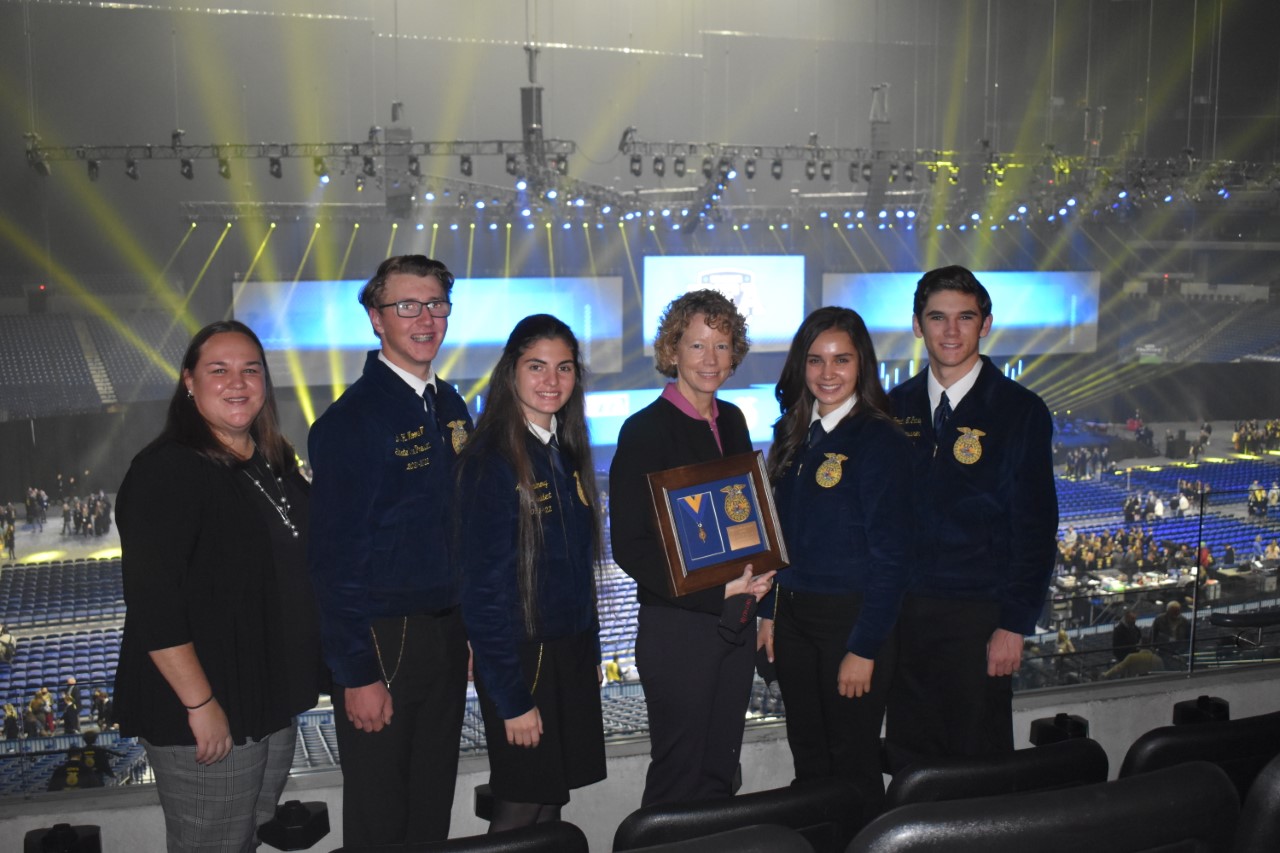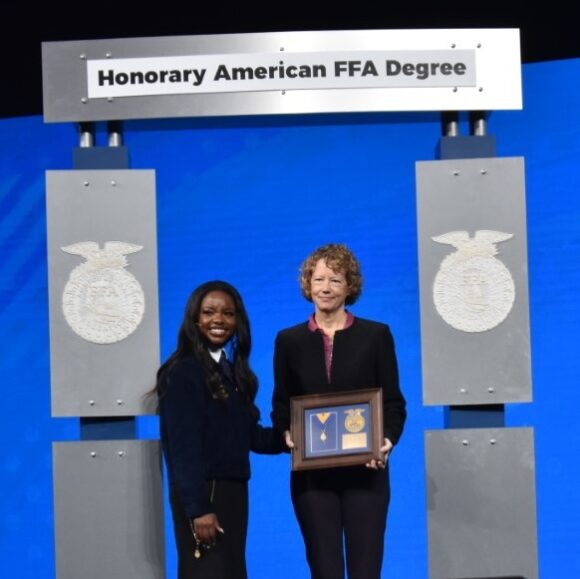
Laura Lawson, interim executive dean at Rutgers’ School of Environmental and Biological Sciences, accepts an Honorary American FFA Degree from the National FFA (Future Farmers of America). Pictured, L-R: Erin Noble, State FFA Advisor for New Jersey; Ivan Moore (State FFA Vice President); Abigail Goodenough (State FFA President); Laura Lawson; Talia Priore (Executive Committee Chair); and Jonathan Finney (State FFA Treasurer).
Laura Lawson, interim executive dean at Rutgers’ School of Environmental and Biological Sciences, recently received an Honorary American FFA Degree from the National FFA (Future Farmers of America.)
Lawson, along with her fellow honorary degree recipients, were recognized as “individuals who have provided exceptional service on a national level to agriculture, agricultural education, or FFA.”
“Being at the National FFA convention to receive this honor was an amazing experience,” said Lawson. “Seeing more than 55,000 FFA members gather to share their knowledge and passion about agriculture gave me hope for the future of farming, agricultural education and related industries.”
“We value Dr. Lawson’s perspective and knowledge and recognize the great strides she is making to support the development of young leaders in the agriculture industry,” said Erin Noble, state program leader for Food, Agriculture and Natural Resources Education at the New Jersey Department of Agriculture, who has served as New Jerey’s State FFA Advisor since 2019.
New Jersey has more than 2,300 FFA members who engage in personal, career and leadership development activities as they develop agricultural skills and competencies. Lawson was nominated by the New Jersey FFA Executive Board.
Lawson spoke to Rutgers Today about her role and the university’s efforts to advance agricultural education.

Artha Jonassaint, National FFA Southern Region Vice President, is pictured with Laura Lawson.
How would you describe your primary research interests and contributions to agricultural education?
Prior to my time at Rutgers, my focus was on urban agriculture, and through that I realized the need for supportive organizations that encourage young people to go into agriculture and farming. This is one of the reasons I wanted to come to SEBS – to allow more interdisciplinary and applied research and teaching opportunities.
Since being involved with the New Jersey FFA, I’ve had the pleasure of working with the statewide organization and Rutgers students who are part of the FFA community. Together, we’ve worked on getting FFA events on campus and developing agricultural education opportunities.
At SEBS, we’ve also developed Courses in the Curriculum for Agricultural Science Education (CASE,) an instructional system of approved courses for college credit that provides intense teacher professional development and curriculum. Now, CASE is changing the culture of agriculture programs.
As part of your Rutgers tenure, you served as dean of Agriculture and Urban Programs. What were some of the real-world impacts of your service in this role?
This role focuses on building bridges among the work of Rutgers Cooperative Extension, communities engaged in urban agriculture and developing opportunities to involve Rutgers students. We received requests from communities and tried to match their needs with faculty and students interested in community-based work.
We also started developing the living lab concept for campus. This grew out of a series of students’ theses that investigated the opportunity to use campus as an example of sustainability and best practices in land stewardship. We also reinvigorated the Student Farm by bringing it to Rutgers Gardens, expanding its outreach to students and community and reframing its mission to address food insecurity.
Rutgers has deep agricultural roots as a land-grant institution dating back to 1862. How has the university – like New Jersey agriculture – adapted in this highly urbanized state?
Rutgers–New Brunswick benefits from its highly diverse student body, which brings many different perspectives on food, farming, cultural connections to land and agriculture, nutrition and much more. When I teach courses that address food or family histories with land, I end up learning so much from our students.
New Jersey is unique in its land use diversity, too. Many people have limited access to farmland, so it is important that Rutgers provides some examples of small-scale agriculture — community gardens, small-scale farming, organic farming, hydroponics and more. We need to demonstrate the alternatives that community organizations may be proposing to address community food insecurity, which is big concern in many New Jersey communities.

